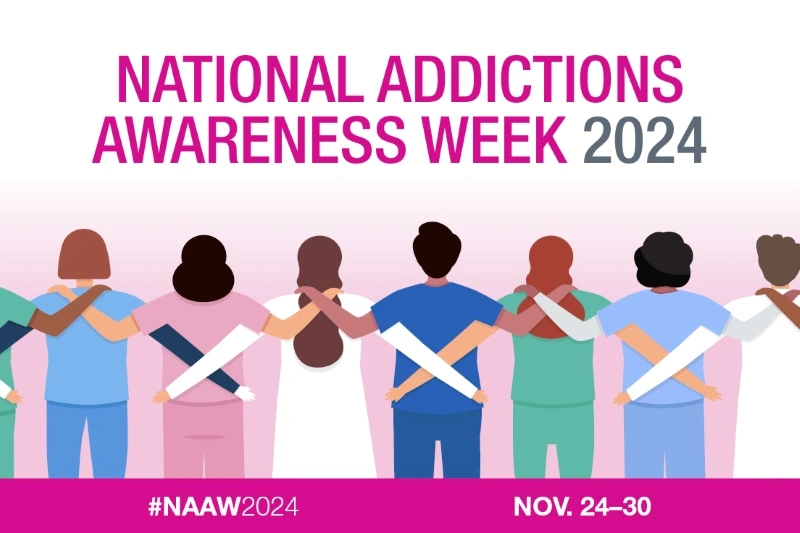From November 24 to 30, Canada observes National Addictions Awareness Week (NAAW), a critical initiative that shines a light on the complexities of substance use and addiction while fostering solutions for prevention, harm reduction, and recovery. This year’s theme, Forging Connections, highlights the importance of building bridges between individuals, communities, and organizations to address the challenges of substance abuse collaboratively.
The Canadian Centre on Substance Use and Addiction offers lots of information and resources available for individuals, as well as friends and family of loved ones struggling with addictions.
Understanding Addiction in Canada

Addiction affects individuals across all demographics, creating a ripple effect of challenges for families and communities. With over 400 Canadians hospitalized daily for substance use-related harms, the urgency to address this issue cannot be overstated. NAAW serves as a platform to raise awareness, challenge stigma, and promote accessible support for those impacted by substance use disorders.
The Importance of Forging Connections
Substance use health is a multifaceted issue, with varying perspectives on how best to tackle it. This diversity of opinions often makes it challenging to find common ground. The theme “Forging Connections” emphasizes collaboration, encouraging everyone to share experiences and ideas to create effective, inclusive solutions. Through open dialogue and collective action, all Canadians can drive meaningful change.
A Week of Focused Themes

Each day of National Addictions Awareness Week 2024 is dedicated to a specific topic, providing opportunities to learn and reflect:
- Cannabis (Sunday, November 24)
Despite its legalization in Canada, cannabis use carries risks, particularly for young people. Starting at an early age increases the likelihood of developing health issues such as addiction, anxiety, and depression. Research also shows that individuals with impulsive tendencies are more prone to problematic cannabis use. Prevention and education are key to reducing these risks. - Substance Use and Stigma (Monday, November 25)
Stigma is one of the biggest barriers to seeking help for substance use disorders. It fosters isolation and discourages individuals from accessing treatment. By shifting to a person-first language and fostering empathy, we can create a supportive environment where recovery is more attainable. - Fentanyl (Tuesday, November 26)
Fentanyl, an extremely potent opioid, continues to drive overdose deaths across Canada. Even trace amounts can be fatal, making public education about its dangers crucial. Harm reduction strategies, such as supervised consumption sites and access to naloxone, are essential in saving lives. - Opioids (Wednesday, November 27)
The opioid crisis remains a significant public health challenge, with over 30,000 opioid-related deaths recorded in Canada since 2016. While prescription opioids can effectively manage pain, misuse and dependency are common risks. Education on safe prescribing practices and alternative pain management techniques is vital. - Gambling (Thursday, November 28)
Gambling addiction, often overlooked in discussions of substance use, has seen increased prevalence due to the accessibility of online platforms. Those struggling with gambling often face mental health challenges, including anxiety and depression, further complicating their journey to recovery. - Alcohol (Friday, November 29)
Alcohol-related harms remain a leading cause of preventable deaths in Canada. Excessive consumption is linked to injuries, violence, and long-term health issues such as liver disease and cancer. Reducing alcohol intake not only improves individual well-being but also benefits families and communities. - Journey to Wellness is Real (Saturday, November 30)
Recovery is a unique process for everyone, requiring tailored support and resources. A key step in promoting recovery is reducing stigma and encouraging open conversations about addiction as a treatable health condition.
Taking Action During National Addictions Awareness Week

This week offers an important opportunity to help combat the challenges of addictions:
- Educate Yourself: Learn about the risks, impacts, and treatment options for addiction.
- Challenge Stigma: Treat those affected by substance use disorders with dignity and compassion.
- Forge Connections: Engage with your community to support harm reduction initiatives and accessible treatment programs.
By coming together, we can help reduce the harms associated with substance use and support the well-being of individuals across Canada.
Final Thoughts

National Addictions Awareness Week 2024 reminds us of the power of connection. Whether through sharing stories, creating supportive networks, or advocating for better resources, every action helps forge a healthier, more understanding society. Together, we can build a future where recovery is not just possible but celebrated.
ABM College offers a comprehensive Addictions and Community Service Worker Diploma, equipping graduates with the skills to create positive change and make meaningful impacts in their communities.
If you or someone you love is struggling with addiction, please don’t hesitate to reach out – there are resources to help:
- British Columbia: Recovery Services and Treatment Support
- Alberta: Alberta Health Services Addiction Helpline
- Saskatchewan: Mental Health and Addictions Services
- Manitoba: Manitoba Addictions Helpline
- Ontario: ConnexOntario Mental Health and Addictions Services
- Quebec: Portage Drug Rehab
- Newfoundland: Treatment Centres
- New Brunswick: Addiction and Substance Use
- Nova Scotia: Addiction Services
- Prince Edward Island: Provincial Addictions Treatment Facility
Read more trending blogs.
About The Author

Content Editor
Stephen Emond is an award-winning author and a content editor. He has broad experience in content development, copy editing, journalism, marketing, and information technology spanning a variety of industries. He has published a series of best selling historical reference guides covering decades of computer and video gaming history. Stephen is currently working as a Content Editor and Writer at ABM College.
